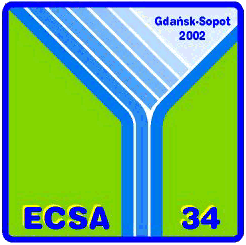
ESTUARIES AND OTHER BRACKISH AREAS
- POLLUTION BARRIERS OR SOURCES TO THE SEA?
Estuarine and Coastal Sciences Association Symposium *34
15-20 September, 2002, Gdańsk-Sopot, Poland
Faculty of Law and Administration building
ul. Bażyńskiego 6
80-952 Gdańsk
see map
and
Polish Scientific Committee on Oceanic Research
(Polish SCOR)
ul. Powstańców Warszawy 55, 81-712 Sopot, Poland
tel: (+48 58) 550 32 32
fax: (+48 58) 551 21 30
home page:http://www.iopan.gda.pl
Land-based sources have been recognised as a major problem by all studies and activities aiming at the protection of health and equilibrium of marine environment. From among these sources the areas located at the river mouths are receiving most attention. This is the result not only of the fact that these are the sources of most significant pollution to the sea but more of that these are regions with an especially complicated biogeochemistry of pollutants. These areas are influenced by different irregularly variable factors and thus so difficult to describe and forecast.
The aim of the ECSA 34 Symposium is to allow specialists of different disciplines and from different countries to compare their results and discuss which are the more hazardous pollutants introduced by rivers to the marine environment, which of them are being controlled and by which methods, and which factors determine their harmful influence upon the adjacent sea. Furthermore, the meeting will discuss the abilities of ecosystems of such transitional areas to assimilate pollution depending on site-specific local conditions, which may be easier elucidated when compared with generic regions in the world. The elucidation of the above problems will reveal the mechanism of functioning of these transitional areas and assess whether they are more sources or rather barriers to pollutants entering the sea. To achieve these goals, it is the aim to consider that following topics in detail:
- contamination and pollution, signs, symptoms and effects on ecosystem equilibria
- biogeochemistry of contaminants and pollutants
- biogeochemistry and environmental conditions
- biological response to contaminants and pollutants
- effects of natural or man induced changes (e.g. morphology, river discharges, meteorological conditions, engineering works) to dispersal of dissolved and particulate substances
- modern monitoring and
surveillance:
- procedures and schemes
- physico-chemical analyses and biotests
- source orientated approaches to assessment and control
- surveillance - target orientated approaches to assessment and control
- predictive and remediation techniques
- bioassays - individual, population, community and ecosystem measures of health and system integrity
- legislative and statutory control
Scientific Advisory Board of ECSA 34:
- C.M.G. van den Berg - University of Liverpool, UK
- Jos Brils - TNO, Den Helder, The Netherlands
- G. Thomas Chandler - University of South Carolina, Columbia, USA
- Bruno Pavoni - University of Venice, Italy
- Marcin Pliński - University of Gdańsk, Poland
- Eeva-Liisa Poutanen - Ministry of the Environment, Environmental Protection Department, Finland
- James Readman - Plymouth Marine Laboratory, UK
- Piotr Szefer - Medical University of Gdańsk, Poland
- Detlef Schulz-Bull - Baltic Sea Research Institute, Warnemünde, Germany
- Irena Telesh - Zoological Institute, Russian Academy of Sciences, St.Petersburg, Russia
- Andrzej Zieliński - Institute of Oceanology, Polish Academy of Sciences, Sopot,
- ECSA
- Victor de Jonge, University of Groningen, The Netherlands
- Mike Elliot, Hull University, U.K.
- Polish SCOR
- Piotr Szefer, Medical University of Gdańsk,
- Jacek Namieśnik, Technical University of Gdańsk,
- Maria Szymelfenig, University of Gdańsk,
- Waldemar Surosz, University of Gdańsk
- IO-PAS
- Grażyna Kowalewska
- Jacek Wyrwiński
- Sławomir Sagan
- Joanna Konat
- Małgorzata Szymczak